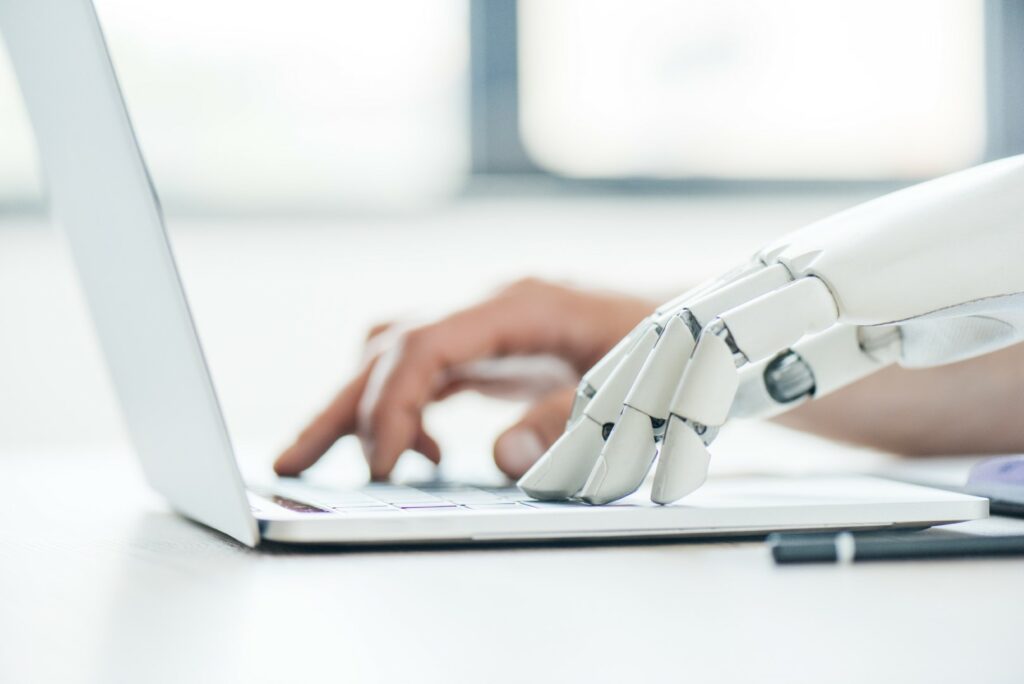Being human and Artificial Intelligence: Progress or threat?
Being human and Artificial Intelligence: Progress or threat?
The use of Artificial Intelligence is not only controversially discussed: between change and challenge it also raises existential questions.
Controversial discussions
Achievements in Artificial Intelligence are undoubtedly fulfilled and manifest themselves in many different areas. These include, for example, the aerospace sector,[1] the automotive industry,[2] medicine,[3] and the economy,[4] but also healthcare[5] and educational[6] settings. Artificial Intelligence has become a useful and integral part of everyday life.
But there are also negative and warning voices. For example, some fear that their jobs could be endangered by the implementation of Artificial Intelligence[7] or that they will no longer be able to cope in societies dominated by technology.[8] Furthermore, digitalisation seems to be progressing too fast for many people.[9] Others complain that humans are increasingly disappearing behind technology and, at least in part, are even being replaced by it.[10]
To bring it to the point: it can be observed that many people are somewhat hesitant about the topic of Artificial Intelligence, and in any case it is being discussed controversially.[11] But what can Artificial Intelligence really do: where can it replace humans, where can it not?
An exemplary look at the German field of education
At this point we would like to take a look at the field of education and teaching in Germany.
At the height of the COVID-19 pandemic, the previously slow progress of digitalisation in German schools experienced an extreme acceleration.[12] Many teachers became familiar with digital learning opportunities and forms of work almost overnight.[13] Digital platforms and communication tools for online meetings were used excessively,[14] not only to be able to continue teaching children and young people during lockdown, but also not to lose personal contact, especially with pupils from precarious social backgrounds.[15] Particularly the latter implies insightful potential regarding chances and limitations of the use of Artificial Intelligence: it can undoubtedly bring many advantages, because through it, for example, many suitable and didactically valuable learning tools can be made available. This potential is far from being exhausted. And not only that: it can also promote social contacts by enabling accessible and, in most cases, smooth communication.
Important relationships
What is decisive, however, is that these social contacts are ultimately generated by people and not by machines. Only human beings can enter into relationships with other human beings and, religiously speaking, with God. Only humans can develop compassion for other beings and a sense of responsibility for them.
Especially during the pandemic, the importance of the latter has become apparent. Young people have also discovered their vulnerability and limitations. Quite a few have been confronted with illness and, in extreme cases, death.[16] What is essential is that all this can only be experienced by humans and that it is only possible for humans to communicate about these existential experiences. In times of crisis, especially young people who are not yet so familiar with life need this form of communicational support.[17]
Artificial Intelligence as a tool
Artificial Intelligence cannot do this, but it can make the path to this kind of communication and the cultivation of these bonds of trust much easier. In this sense, Artificial Intelligence is also indispensable because it is an important and very useful tool, created by humans.
Being human
These considerations ultimately lead to the question: what does it mean to be human?
Being human means being vulnerable and mortal but also being unique, loving, and capable of having relationships. Human beings are defined by their mortality and their capacity to reflect on their existence and the possibility of a divine creator.[18] These reflections are not only significant for the field of (religious and philosophical) education, but for all areas in which Artificial Intelligence is used.
Chance and challenge
Artificial Intelligence can serve well if used adequately. This happens when human beings are taken as the starting point and the machine does not become the central focus. In this sense, digitalisation in schools has a serving function. What is certain is that work through Artificial Intelligence must be reconceptualised and developments have to be followed attentively. Then, Artificial Intelligence constitutes progress and not threat.
Want to learn more about similar topics? Go to the EARS Dashboard.
Sources
[1] Artificial Intelligence as a Service (AIaaS)
[2] Künstliche Intelligenz in der Automobilbranche
[3] Wie KI die Medizin revolutioniert
[4] Einsatz von Künstlicher Intelligenz in der Deutschen Wirtschaft
[5] So kann KI in der Pflege unterstützen: Anwendungsszenario zeigt Chancen und Grenzen
[6] Künstliche Intelligenz in der Bildung der Zukunft – individuell, flexibel, vernetzt und lebenslang?
[7] Wie künstliche Intelligenz unsere Jobs gefährdet
[8] „Deutschland steht sich selbst im Weg“
[9] Infografik: Wie schnell die Digitalisierung voranschreitet
[10] Wo Künstliche Intelligenz den Menschen ersetzen wird
[11] KI im Mittelstand – Deutschland kommt nur langsam voran
[12] Corona und Schulen: Schub für die Digitalisierung
[13] Kreative Lehrer und genervte Eltern
[14] Digitales Lernen in Corona-Zeiten: Microsoft erobert die Schulen
[15] Domsel, Maike Maria: Geschlossene Gesellschaft trotz offener Türen? Chancen und Grenzen durch Digitalisierung im Bereich der inklusiven Bildung, in: Jungwirth, Martin / Harsch, Nina / Noltensmeier, Yvonne / Stein, Martin / Willenberg, Nicola (Ed.): Diversität digital denken. The wider view (Schriften zur Allgemeinen Hochschuldidaktik 8) Münster 2022.
[16] Leben bis zuletzt oder Sterben in Einsamkeit?
[17] Kabinett: Belastete Kinder und Jugendliche brauchen zusätzliche Unterstützung
[18] Domsel, Maike Maria: Leben bis zuletzt. Eine freiheitstheoretische Fundierung christlicher Sterbebegleitung, Stuttgart 2019.






